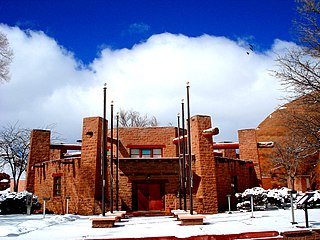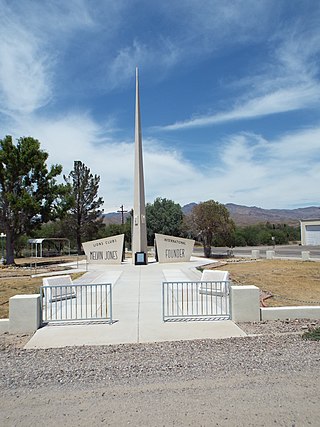Related Research Articles

Apache County is in the northeast corner of the U.S. state of Arizona. Shaped in a long rectangle running north to south, as of the 2020 census, its population was 66,021. The county seat is St. Johns.

Coconino County is a county in the north-central part of the U.S. state of Arizona. Its population was 145,101 at the 2020 census. The county seat is Flagstaff. The county takes its name from Cohonino, a name applied to the Havasupai people. It is the second-largest county by area in the contiguous United States, behind San Bernardino County, California. It has 18,661 sq mi (48,300 km2), or 16.4% of Arizona's total area, and is larger than each of the nine smallest states in the U.S.

Gila County is in the central part of the U.S. state of Arizona. As of the 2020 census, the population was 53,272. The county seat is Globe.

Maricopa County is in the south-central part of the U.S. state of Arizona. As of the 2020 census the population was 4,420,568, or about 62% of the state's total, making it the fourth-most populous county in the United States, the most populous county in Arizona, and making Arizona one of the nation's most centralized states. The county seat is Phoenix, the state capital and fifth-most populous city in the United States.

Navajo County is in the northern part of the U.S. state of Arizona. As of the 2020 census, its population was 106,717. The county seat is Holbrook.

Yavapai County is near the center of the U.S. state of Arizona. As of the 2020 census, its population was 236,209, making it the fourth-most populous county in Arizona. The county seat is Prescott.

McNary is a census-designated place (CDP) in Apache and Navajo counties in the U.S. state of Arizona, on the Fort Apache Indian Reservation. The population was 528 at the 2010 census. It is a 30-minute drive from Show Low and a 10-minute drive from Pinetop-Lakeside.

Globe is a city in Gila County, Arizona, United States. As of the 2020 census, the population of the city was 7,249. The city is the county seat of Gila County. Globe was founded c. 1875 as a mining camp. Mining, tourism, government and retirees are most important in the present-day Globe economy.

Cibecue is a census-designated place (CDP) in Navajo County, Arizona, United States, on the Fort Apache Indian Reservation. The population was 1,713 in the 2010 United States Census.

Whiteriver is a census-designated place (CDP) located on the Fort Apache Indian Reservation in Navajo County, Arizona, United States. The population was 4,104 at the 2010 census, making it the largest settlement on the Reservation.

The Fort Apache Indian Reservation is an Indian reservation on the border of New Mexico and Arizona, United States, encompassing parts of Navajo, Gila, and Apache counties. It is home to the federally recognized White Mountain Apache Tribe of the Fort Apache Reservation, a Western Apache tribe. It has a land area of 1.6 million acres and a population of 12,429 people as of the 2000 census. The largest community is in Whiteriver.
Whiteriver Unified School District is a school district in Navajo County, Arizona, United States.
Alchesay High School is a public high school on the Fort Apache Indian Reservation in Whiteriver, Arizona, Navajo County. It was founded in 1956 and named after Chief Alchesay, who was a key person in the formation of the White Mountain Apache tribe. The first graduating class graduated in 1960.

Fort Thomas is a census-designated place in Graham County, Arizona, United States. Its population was 319 as of the 2020 census. The community has an elementary school and a high school. It is part of the Safford Micropolitan Statistical Area. Fort Thomas has a ZIP code of 85536.
The Fort Sill Apache Tribe is the federally recognized Native American tribe of Chiricahua Warm Springs Apache in Oklahoma.

Fort Mohave is an unincorporated community and CDP in Mohave County, Arizona, United States. It is named for a nearby fort that was used during the Mohave War. As of the 2020 census, the population of Fort Mohave was 16,190, up from 14,364 in 2010 and 8,919 in 2000. It is a suburb of Bullhead City. Its recent growth has made it the most populous unincorporated community in Mohave County.

The Bureau of Indian Education (BIE), headquartered in the Main Interior Building in Washington, D.C., and formerly known as the Office of Indian Education Programs (OIEP), is a division of the U.S. Department of the Interior under the Assistant Secretary for Indian Affairs. It is responsible for the line direction and management of all BIE education functions, including the formation of policies and procedures, the supervision of all program activities, and the approval of the expenditure of funds appropriated for BIE education functions.
Cañon Elementary School District 50 is a school district in Black Canyon City, Yavapai County, Arizona. It operates a single K-8 school, Cañon Elementary School.

Mary V. Riley was an Apache tribal council member who was instrumental in the economic development of the White Mountain Apache Tribe. She was the first woman to be elected to serve on the tribal council and worked toward bringing timber and tourism industries to the reservation to ensure their economic stability. She was inducted into the Arizona Women's Hall of Fame posthumously in 1988.
References
- 1 2 3 4 5 6 "Search for Public School Districts – District Detail for Young Elementary District (4213)". National Center for Education Statistics . Institute of Education Sciences . Retrieved 2022-03-05.
- ↑ "Young Elementary School". National Center for Education Statistics . Retrieved 2022-02-01.
- ↑ Shaffer, Mark (1984-06-17). "Rural schools leaping at 4-day week". The Arizona Republic . Phoenix, Arizona. pp. B1, B10. - Clipping of first and of second page at Newspapers.com.
- ↑ "2020 CENSUS - SCHOOL DISTRICT REFERENCE MAP: Gila County, AZ" (PDF). U.S. Census Bureau . Retrieved 2022-01-30.